Top English-Speaking University Courses in Croatia
June 24, 2021 - There is a selection of universities in Croatia which offer English-taught programmes, whether they be undergraduate degrees, graduate degrees, or postgraduate studies. Some are Croatian institutions, while others are campuses of international universities based in Croatia. Their fees and entry requirements vary, but all of them would allow you to study in Croatia without having to learn a whole new language first. A look at the top English-speaking university courses in Croatia.
The number of English-speaking study programmes in Croatia has been on the rise in recent years as Croatian universities explore new ways to stand out from their European competition and attract bright minds into their midst. With a history of distinguished professionals now working in renowned international organizations, Croatia has long ago proved that it offers the same quality of education as its international counterparts at only a fraction of the cost.
University of Zagreb
The University of Zagreb celebrated its 350th anniversary in 2019. The oldest public university in the country, Zagreb Uni offers the largest number of English-taught courses, from undergraduate to doctoral degrees executed in coordination with the University of Padua and the University of Canterbury.
Zagreb is often referred to as a safe city tailored to the needs of its people, with its lush green parks, year-round festivals, exhibitions, and concerts, as well as rich student life and countless student discounts. Well connected to other European metropolises, Zagreb also presents a great base for affordable travel during the winter or summer break. To learn more about the process of enrolling into Zagreb Uni as an international student, start here. You can look through your potentials picks in the text below.
Undergraduate Study Programmes
Bachelor Degree in Business - Faculty of Economics & Business
Undergraduate Degree in Electrical Engineering and Information Technology - Faculty of Engineering and Computing
Integrated Undergraduate and Graduate University Study Programmes
Veterinary Studies in English - Faculty of Veterinary Medicine
Medical Studies in English - Medical School
Dental Medicine - School of Dental Medicine
Graduate University Study Programmes
Electrical Engineering and Information Technology - Electrical Power Engineering - Faculty of Engineering and Computing
Information and Communication Technology - Robotics - Faculty of Engineering and Computing
Computing - Data Science - Faculty of Engineering and Computing
Environment, Agriculture and Resource Management - Faculty of Agriculture
Marketing - Faculty of Economics & Busines
Management - Faculty of Economics & Business
Managerial Informatics - Faculty of Economics & Business
Trade - Faculty of Economics & Business
Doctoral Study Programmes
Biomedicine and Health Sciences – School of Medicine
Joint Doctoral Study Programme Human Rights, Society, and Multi-Level Governance – Faculty of Law (University of Zagreb), Università degli Studi di Padova (University of Padua), University of Canterbury, University of Western Sydney, Panteion University of Social and Political Sciences
Electrical Engineering and Computing – Faculty of Electrical Engineering and Computing
Mechanical Engineering, Naval Architecture, Aeronautical Engineering, Metallurgical Engineering – Faculty of Mechanical Engineering and Naval Architecture and Faculty of Metallurgy
Kinesiology – Faculty of Kinesiology
Postgraduate Specialist Study Programmes
University Interdisciplinary Postgraduate Specialist Study Programme in Diplomacy - University of Zagreb
Postgraduate Specialist Study Programme in MBA in Construction - University of Zagreb
Doctoral Study Programmes
Biomedicine and Health Sciences – School of Medicine
Joint Doctoral Study Programme Human Rights, Society, and Multi-Level Governance – Faculty of Law (University of Zagreb), Università degli Studi di Padova (University of Padua), University of Canterbury, University of Western Sydney, Panteion University of Social and Political Sciences
Electrical Engineering and Computing – Faculty of Electrical Engineering and Computing
Mechanical Engineering, Naval Architecture, Aeronautical Engineering, Metallurgical Engineering – Faculty of Mechanical Engineering and Naval Architecture and Faculty of Metallurgy
Kinesiology – Faculty of Kinesiology
University of Rijeka
Hailed as the EU’s “port of diversity” after its designation as European Capital of Culture in 2020, Rijeka is Croatian's third-largest city and thought to be #1 in terms of inclusion and tolerance.
The University of Rijeka introduced its English-language Biotechnology for the Life Sciences (Biotech4LS) Masters programme in 2020, with the capacity of 10 students, and received five times this many applicants from more than 10 countries in the first round of applications.
Specifically aimed at developing the skills students need to pursue a future career in research, whether at a University or in industry, Biotech4LS is one of only a handful of courses in the entire European Union to take this approach. As a result, this course will not only be training a new generation of dynamic young scientists but also highlighting Rijeka as an emerging centre for scientific research when (and if!) they decide to return to their home countries. Extensions
Private universities in Croatia
Rochester Institute of Technology (RIT)
RIT is a private American university with campuses both in the country's capital city of Zagreb and the Pearl of the Adriatic, the famous Dubrovnik. This means that the general structure, courses offered, and teaching language is all that of an American university, but students get to benefit from living overseas (but possibly by the sea, if they so choose) while they study at a considerably lesser cost than in the U.S. The first university in the US to introduce the Information technology program in 1992, RIT offers three undergraduate programmes - Web and Mobile Computing, Business Administration and Hospitality and Tourism Management and two graduate programmes, Service Leadership and Innovation and Information Sciences and Technologies.
Algebra
University College of Algebra has long established its position as an institution of higher learning aimed at building globally competitive careers in digital technologies. The largest Croatian private educational organization present in more than 20 cities across Croatia, you can find out more about Algebra's unique approach to recruiting new students at Croatia: Your Live and Learn Destination. Always following the latest trends, Algebra adopted the practice of organising annual winter and summer schools to give their potential students a taste of everything Algebra has to offer. In 2020, Algebra welcomed its first generation of graduate students who will attend lectures on digital marketing or software engineering in the English language.
For more on lifestyle in Croatia, CLICK HERE.
Croatia's First Enogastronomy Study Programme: Students to Learn About Pairing Indigenous Wine and Food
May 25, 2021 - As reported by Večernji list, the Polytechnic of Požega will from the next academic year offer Croatia's first enogastronomy study programme.
The first study programme in the field of biotechnical sciences is focused on the quality and health of food and beverages, primarily in the hospitality and tourism sector.
At the Polytechnic, they point out that the current development of gastronomy in Croatia must not be left to chance and that the need for the education of experts in this area is becoming increasingly important.
There are now three national gastronomy study programmes in Croatia, but this is the only study programme of enogastronomy, which means that the science and study of wine will play a significant role. But, the key difference is that this is the only STEM study programme of its kind.
"Unlike the other two study programmes, which are predominantly economic and in which marketing and communication dominate, 70 percent of our courses revolve around cooking and only 30 percent are marketing and management," explains doc.dr.sc. Berislav Andrlić, Vice Dean for Development of the Polytechnic.
Although the enrollment quota in the first year has been reduced to 30 full-time students who will study at the expense of the Ministry of Science and Education in Požega, due to the specifics of the study, students from all potential tourist areas of Croatia are expected. A smaller number of students is fitting because cooking involves professional practice with a chef, for which work in small groups is ideal, but the program content includes a number of courses related to indigenous dishes from all parts of Croatia, from Dalmatia and Istria to Slavonia.
"We believe that such a study in Požega is needed for two reasons. The first is the resources we have in the environment, and the second is the needs of the labor market. We have conducted a survey among businessmen, hotels owners, restaurants, and family farms on the Adriatic and on the continent, and more than 70 percent said that they needed such food and beverage managers, restaurant and hotel managers, i.e. people who will know how to create menus and do guest management, and at the same time know how to produce food. So, it offers a combination of both occupations, both sales, and food production, which is not the case with other programmes that are mostly based only on sales," Andrlić points out.
Upon completion of this programme, students will acquire a Bachelor's in engineer food technology, majoring in enogastronomy, which is an innovation compared to other similar faculties where they were bachelors of economics. Potential employers will be all economic entities that are primarily engaged in tourism, i.e. food production on the one hand and tourist catering on the other. With students who complete the study of enogastronomy in Požega, they will get both of these functions in one person.
For more on made in Croatia, follow TCN's dedicated page.
Faculty of Economics University of Zagreb Celebrates 100 Years
ZAGREB December 5, 2020 – With over 9000 students currently enrolled, the Faculty of Economics University of Zagreb is the largest faculty in Croatia. In 2020, this internationally renowned institution celebrates its 100th birthday, so TCN decided to take a closer look.
Every other student you meet in Croatia seems to study economy. It makes you wonder where they all go to after their studies are complete. Are there really so many positions for economists in Croatia?
In 2020, the Faculty of Economics University of Zagreb celebrates its 100th birthday. The long list of its famous former students gives a clue to where all the Croatian economists go – the tourism sector, diplomacy and international relations, business, politics and government.
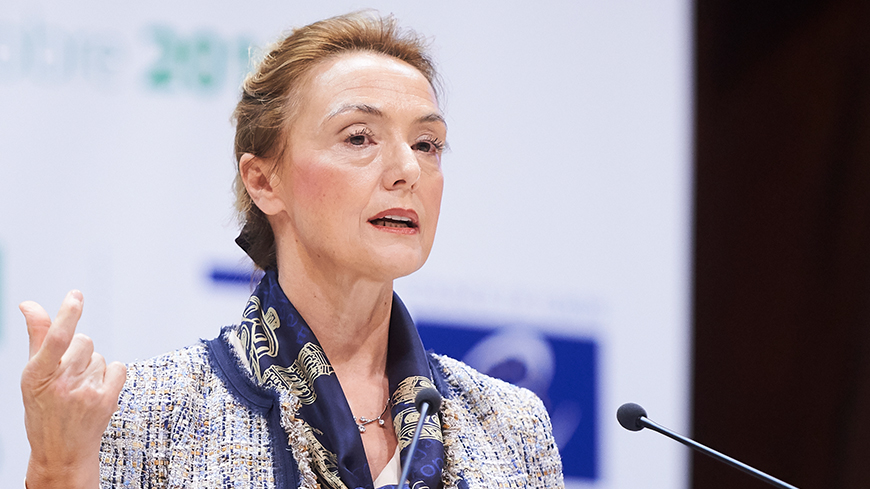 Marija Pejčinović Burić, a graduate of the Faculty of Economics of the University of Zagreb and the current Secretary General of the Council of Europe. After graduating, like Savka Dabčević-Kučar, she became o doctor of economics and before taking her current position served as Croatia's Deputy Prime Minister and Minister of Foreign and European Affairs © Council of Europe
Marija Pejčinović Burić, a graduate of the Faculty of Economics of the University of Zagreb and the current Secretary General of the Council of Europe. After graduating, like Savka Dabčević-Kučar, she became o doctor of economics and before taking her current position served as Croatia's Deputy Prime Minister and Minister of Foreign and European Affairs © Council of Europe
Graduates of the Faculty of Economics University of Zagreb have served as mayors of Zagreb and Split, Deputy Prime Minister of Croatia, Minister of Finance, Minister of the Economy, Secretary-General of the Council of Europe, Governers of the Croatian National Bank, Vice-President of the UN World Food Council, President of the Croatian Football Association, Minister of Environmental and Nature Protection, special advisors to the President of Croatia and countless university professors, including several former rectors of the University of Zagreb. Within its graduate professors, it has produced no less than 19 full members of the prestigious Croatian Academy of Sciences and Arts, more than any other single institution in the country.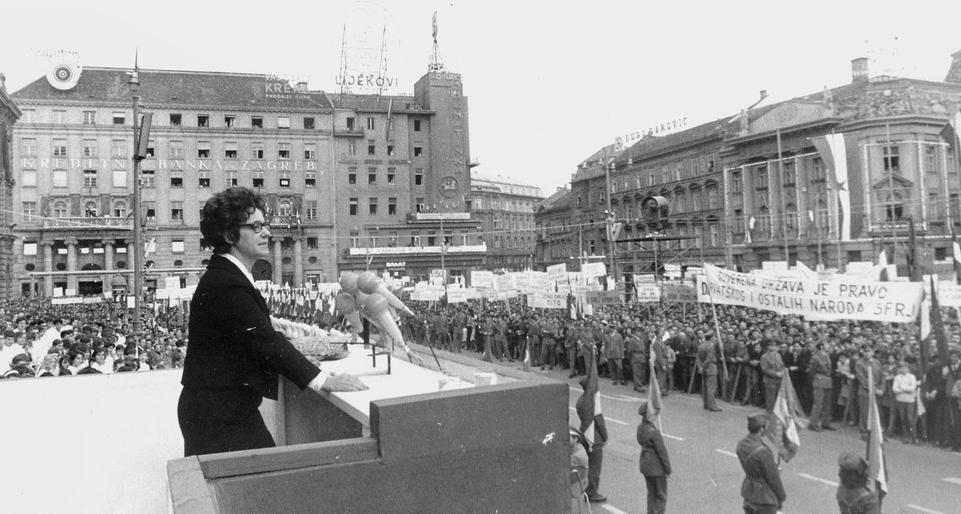 Savka Dabčević-Kučar, a graduate of the Faculty of Economics of the University of Zagreb. Born on Korčula, she became an anti-fascist in World War II, joining the partisans after her brother was beaten by fascists. After graduating, she continued to study at the faculty and became one of the first doctors of economics in Croatia, raising eyebrows by choosing to write her doctorate dissertation about a non-Marxist economic theorist (Englishman John Maynard Keynes). She became a professor at the faculty in the 1950s and despite her great advances in political life, remained a committed teacher at the faculty until 1971. In 1967, she was elected President of the Socialist Republic of Croatia. In 1969, she moved to an even more important position - that of president of the Central Committee of the League of Communists of Croatia. She was the first woman in Europe to be appointed head of government of a political entity and the first female in Croatia to hold an office equivalent to a head of government. In this picture, she addressed supporters on Ban Jelacic Square Zagreb during the movement called the Croatian Spring, which called for greater autonomy for Croatia. At the address, thousands cheered her as “Savka, queen of the Croats”. For her pivotal role in the movement, she was removed from her positions and public life and retired. She returned to politics in 1990 upon the collapse of communism in Europe and during the Croatian war of independence was one of the few politicians who visited the front lines of battle in Slavonia, Petrinja, Pokupski and the Dalmatian hinterland
Savka Dabčević-Kučar, a graduate of the Faculty of Economics of the University of Zagreb. Born on Korčula, she became an anti-fascist in World War II, joining the partisans after her brother was beaten by fascists. After graduating, she continued to study at the faculty and became one of the first doctors of economics in Croatia, raising eyebrows by choosing to write her doctorate dissertation about a non-Marxist economic theorist (Englishman John Maynard Keynes). She became a professor at the faculty in the 1950s and despite her great advances in political life, remained a committed teacher at the faculty until 1971. In 1967, she was elected President of the Socialist Republic of Croatia. In 1969, she moved to an even more important position - that of president of the Central Committee of the League of Communists of Croatia. She was the first woman in Europe to be appointed head of government of a political entity and the first female in Croatia to hold an office equivalent to a head of government. In this picture, she addressed supporters on Ban Jelacic Square Zagreb during the movement called the Croatian Spring, which called for greater autonomy for Croatia. At the address, thousands cheered her as “Savka, queen of the Croats”. For her pivotal role in the movement, she was removed from her positions and public life and retired. She returned to politics in 1990 upon the collapse of communism in Europe and during the Croatian war of independence was one of the few politicians who visited the front lines of battle in Slavonia, Petrinja, Pokupski and the Dalmatian hinterland
The Faculty of Economics University of Zagreb is the largest faculty in the country. Over its 100 year history, it has established itself as an internationally respected institution. Today, it has around 9000 persons enrolled, caters for international students with some courses in English and has produced over 86, 000 graduates, including 856 doctors of science.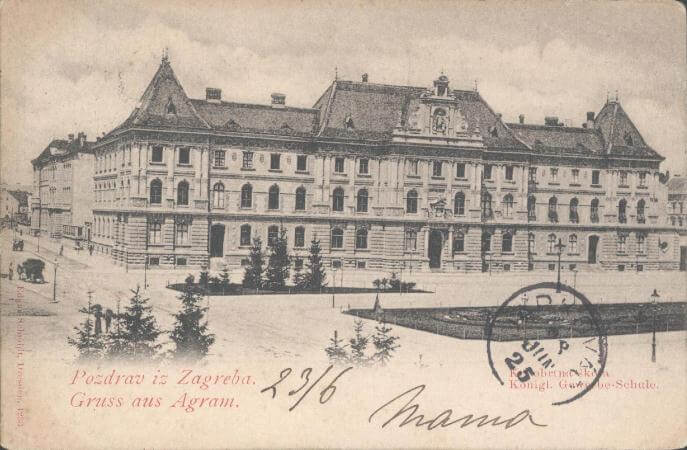 In its infancy, students of the College of Trade and Transport were taught at the Technical College, which is today the Museum of Arts and Crafts in Zagreb © National and University Library in Zagreb
In its infancy, students of the College of Trade and Transport were taught at the Technical College, which is today the Museum of Arts and Crafts in Zagreb © National and University Library in Zagreb
The history of the Faculty of Economics University of Zagreb starts with the opening in 1920 of its forerunner, the Zagreb College of Trade and Transport. Its purpose was to educate in the areas of banking, domestic and international trade, transport, consular services, insurance and the education of teachers. Its courses lasted three years and it proved so popular that in the academic year 1923/24, some 1,125 students were enrolled.
The institution held college status until 1925 when Stjepan Radić became the Minister of Education. It must have been unusual for Radić to find himself as part of the government of the Kingdom of Serbs, Croats and Slovenes, the state which preceded the Kingdom of Yugoslavia. Today, Radić is best remembered as a politician outspoken in his advocacy of autonomy for Croatia. Before his appointment to the government, he had always done so in opposition. Indeed, he had been imprisoned several times for his views, which were proclaimed loudly in his writings or in person (he was a gifted public speaker). As recently as March 1925 he had been in prison but, when the political party of which he was a member officially recognised the monarchy and the state constitution, he was freed. In a remarkable turnaround, before the year's end, he was a minister in the government.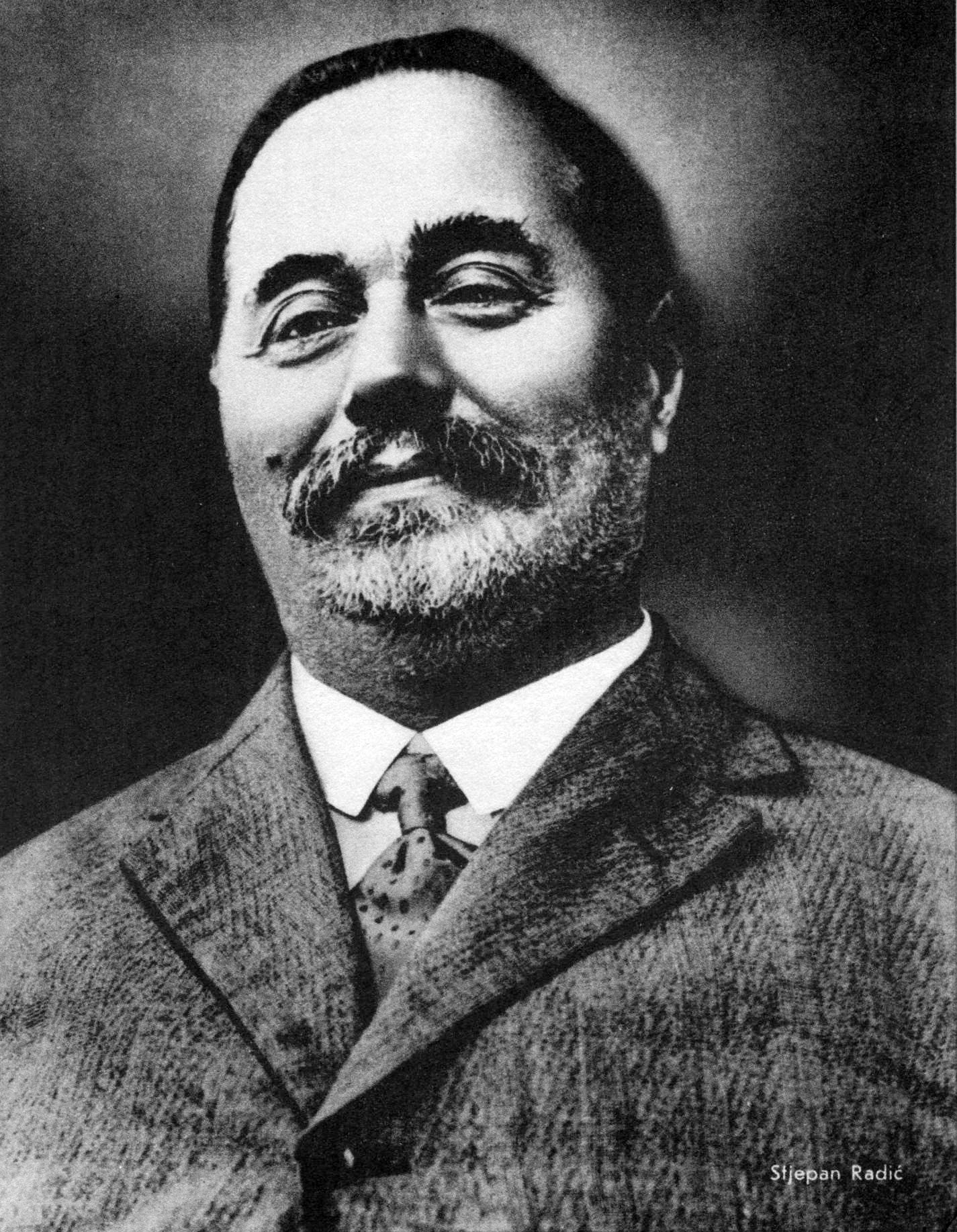 Stjepan Radić, pictured in the 1920s © public domain. In 1895 Radić was sent to prison for the public burning of the Hungarian flag in Zagreb – alongside Antun Dabčević, the father of Savka Dabčević-Kučar.
Stjepan Radić, pictured in the 1920s © public domain. In 1895 Radić was sent to prison for the public burning of the Hungarian flag in Zagreb – alongside Antun Dabčević, the father of Savka Dabčević-Kučar.
Stjepan Radić's desire for Croatian autonomy was not born from the ideals of the political class of Zagreb. The ninth of eleven children, born to a peasant family in a small village on the banks of the Sava river, just north of Sisak, Radić was very much a representative of the people whence he came. To him (and others in his family – his brother and nephew also being prominent politicians), education had the most important role to play in emancipation. He had lived in poverty in order to complete his own - after being banned from university-level educational institutions throughout the whole of the Austro-Hungarian empire for his protests against the state, he travelled penniless to Russia, France and Switzerland to complete his studies. In the latter, finance was one of his chosen subjects.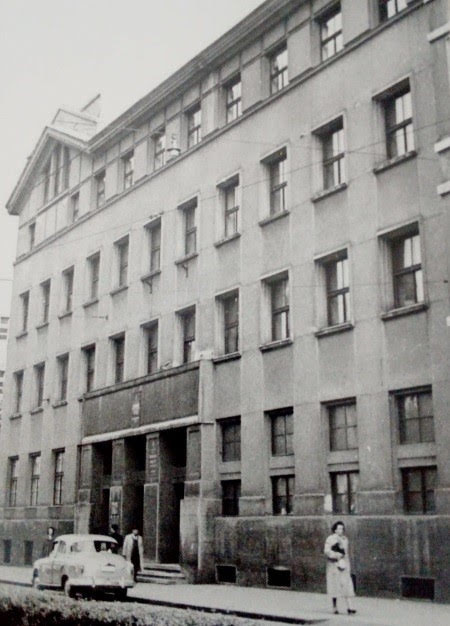 The first dedicated building of the Higher School of Economics and Commerce was located on the corner of Bauerova and Zvonirmirova © Faculty of Economics University of Zagreb
The first dedicated building of the Higher School of Economics and Commerce was located on the corner of Bauerova and Zvonirmirova © Faculty of Economics University of Zagreb
Under Radić's spell in office, the Zagreb College of Trade and Transport became the Higher School of Economics and Commerce. Its courses extended to four years, it attained university status. With no building designated to the increasingly popular institution, students had sometimes been taught at the Technical College (today's Museum of Arts and Crafts) and in parts of what is now the Mimara Museum. A dedicated home for the faculty was authorised and its construction started in 1927. Classes began at the faculty, located on the corner of Bauerova and Zvonimirova, in 1928, but within the decade the institution had outgrown its home and a plot of land in Svetice was acquired in order to build a new, larger facility. Its construction was interrupted by the Second World War and students would end up being taught on the Bauerova and Zvonimirova site all the way up to 1952.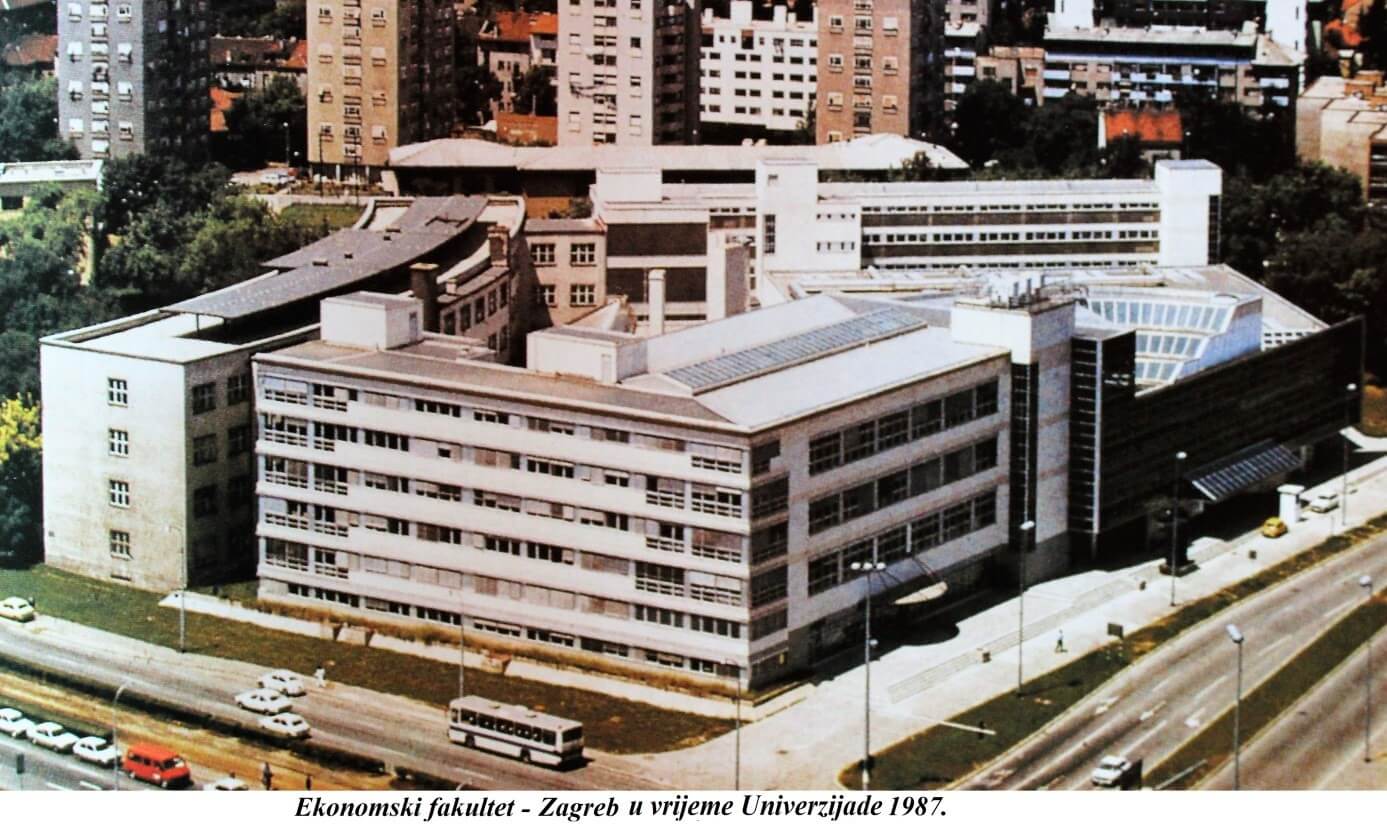 The faculty's modern building, pictured in 1987. Today, the faculty has 17 departments - Finance, Demography, Economic Theory, Business Economics, Informatics, Macroeconomics and Economic Development, Marketing, Mathematics, International Economics, Business in Foreign Languages, Organization and Management, Law, Accounting, Statistics, Trade and International Business, Tourism, Physical Education and Health © Faculty of Economics University of Zagreb
The faculty's modern building, pictured in 1987. Today, the faculty has 17 departments - Finance, Demography, Economic Theory, Business Economics, Informatics, Macroeconomics and Economic Development, Marketing, Mathematics, International Economics, Business in Foreign Languages, Organization and Management, Law, Accounting, Statistics, Trade and International Business, Tourism, Physical Education and Health © Faculty of Economics University of Zagreb
In 1947, the Higher School of Economics and Commerce became the Faculty of Economics University of Zagreb. In 1952, the faculty officially moved to the new site in Svetice. In 1968 it expanded once more when it merged with the 12-year-old College of Economics. Since then, the building at Svetice has received major upgrades and further facilities of the faculty can now also be found at the university campus in Borongaj, in Varaždin, in Koprivnica and in Bjelovar. After a century of existence, the Faculty of Economics University of Zagreb's longstanding difficulties to meet the popularity of its courses with the space available are now over. Not only can they accommodate every Croatian economy student who makes the grade, but they are also able to offer places to some of the best international students. It would surely come as no surprise if they are still educating the future elites of business, banking, finance and politics in another 100 years.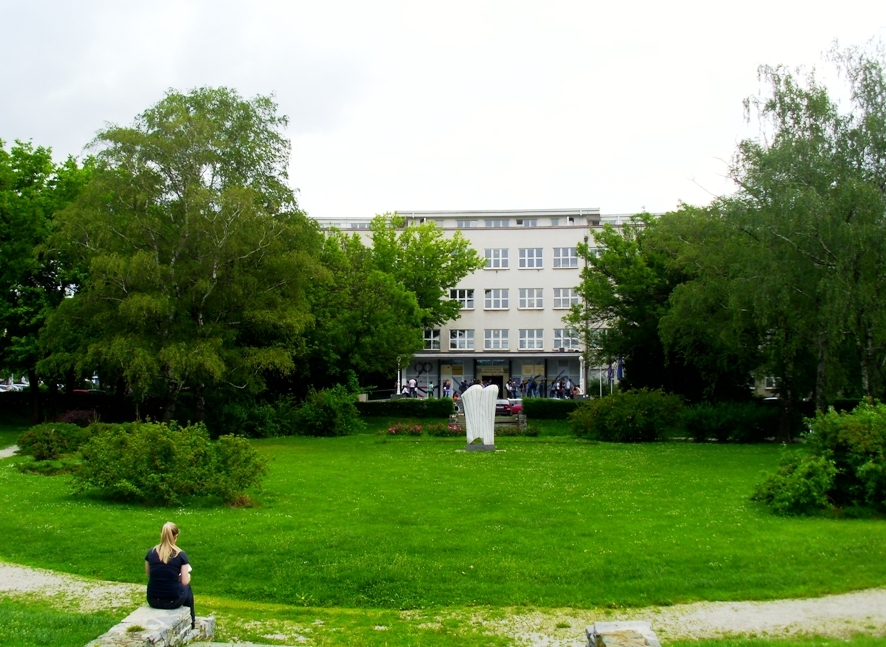
The Faculty of Economics University of Zagreb site in Svetice, as seen from its garden © Wolf - Pidgeon
American Moves to Croatia to Study Video Game Development!
November 4, 2020 – A look at how a 27-year-old American moves to Croatia to study game development at the University of Algebra.
As 24sata reports, One year ago, Nathan Sievers decided to pack his bags and move to Croatia to study game development at the University of Algebra. From an early age, Nathan knew that he wanted to design video games, which he has been doing recreationally since he was 10 years old. However, Nathan studied mathematics in America at the University of California Santa Cruz, where he also found a video game development learning programme.
"That's how I managed to graduate twice – mathematics with an emphasis on programming languages and video games. I later researched colleges outside of America where I could study applied mathematics and I wanted it to be my full-time career, but I came to the conclusion that what I love about mathematics is precisely its applicability in video games," says Nathan, adding that it was important to him that his work is visible outside of academia and that people could enjoy it.
He did great in Croatia
After graduation, he spent time traveling the world and worked as a freelancer. On one of his trips, he visited Croatia and fell completely in love with it.
"Apart from the fascinating natural beauty, I liked the attitude of Croats towards life, your culture, and lifestyle. When I came here, I felt peace and I knew this was a country where I could spend part of my life. So I searched the faculties to continue my studies to see if I could stay here - and I found Algebra," says Nathan enthusiastically.
When he went into study research and found the Game Development programme, he was thrilled with it.
"I felt that I had the opportunity to live in a new place that I enjoyed when I first visited it and that I found a college just right for me," says Nathan.
So Nathan packed his bags and moved to the other side of the world. Although it wasn’t his first time to move abroad (he had already done it once by moving to Australia), now it was a little different for him because the speaking area is not English. But he did great.
Studying is just one of the reasons for moving to Croatia
Nathan completed his first year of graduate studies in Algebra, which he partially attended online because of the coronavirus. He returned to California from Croatia by chance.
"I was planning to go on a study trip to Japan, but I didn't fly with my colleagues. I went to Los Angeles first to do something at home. When we got back, I used the same route because I bought a return ticket, so I stopped in Los Angeles first. Then the corona gained momentum, the lectures were canceled, and I had to stay there. If the situation had been different, I don't know if I would have returned to America," says Nathan.
Still, he is very pleased with Algebra's online lectures.
"It's easier and better when the lectures are live, but I think Algebra did a great job. They prepared very well and provided us with lectures at the highest possible level, so I am satisfied," says Nathan, but admits that he can't wait to return to Croatia.
"I managed to visit some beautiful places while living in Croatia for a short time. You have a beautiful coast and islands, so I can’t wait for the pandemic to end so I can come back. Studying is great, but it’s just one of the reasons why I moved here. I also like the idea of staying there for a few years. I hope to pack up as soon as possible and come again," he says.
For the latest travel info, bookmark our main travel info article, which is updated daily.
Read the Croatian Travel Update in your language - now available in 24 languages.


